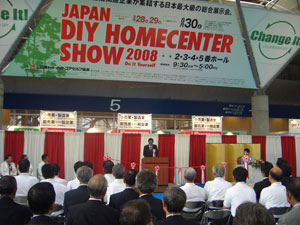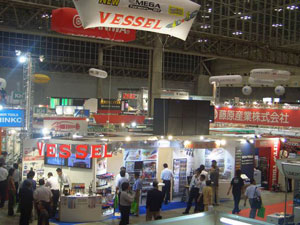Japan DIY Homecenter Show Grows Amid Booming Home-improvements
2009/05/07 | By Steve ChuangBoasting 44-plus-years in history, the Japan DIY Homecenter Show (JHS), held by the Japan DIY Industry Association, is the most specialized trade fair for DIY tools and related products in Asia, hence a key event for foreign buyers and suppliers targeting to tap the rapidly growing DIY segment in Japan, the largest Asian economy.
Held the 44th time from August 28 through 30, 2008, the JHS was staged at the International Makuhari Messe Exhibition Hall in Chiba Ken, a county near Tokyo. The largest fair of its kind in Japan, during the three-day span, saw 420 exhibitors occupying 1,003 booths and attracted some 62,739 visitors worldwide, according to statistic compiled by the show management.
The show organizer noted that 104 of the foreign exhibitors came from 11 countries, including Taiwan, China, India, the U.S., Hong Kong, Korea, France, Iran, Malaysia, Russia and Singapore, 48 or 46% of which were from Taiwan alone, indicating, among other reasons, that Taiwanese hardware and DIY tool makers are popular in the eyes of Japanese consumers and buyers, who are typically regarded as the most quality-sensitive globally.

Perhaps the recession in Japan has compromised new home buys to spark higher DIY home-improvement activities in the country: As the Japanese DIY segment has grown increasingly robust in recent years, so has such expansion fueled the burgeoning Japanese DIY home-improvement centers, whose number, according to the show organizer, has risen to nearly 4,000 nationwide in 2007, with sales in the market shooting up to an estimated 4 trillion yen (around US$44 billion at JPY90:US$1).
Home centers in Japan retail mainly DIY tools and related hardware, including pneumatic tools, carpentry tools, automotive accessories, building and decorative materials and related accessories for do-it-yourselfers, with products ranging from the low to the high end. The boom in the sector shows clearly that Japanese consumers are gradually willing to buy low-to-mid range DIY products, partly due to the recent global downturn, for having keener interest in being "Nichiyoubi Daiku" (literally Sunday carpenter)-picking up tools and equipment to repair furniture or plumbing in their own houses.

Wide-ranging Displays
Being the largest of its kind has advantages: the 2008 JHS exhibited just about everything a do-it-yourselfer needs, including carpentry tools, power tools, hand tools, pneumatic tools, garden tools, plumbing tools, hardware, building materials, lighting, interior and home fashions, outdoor products, kitchen and housekeeping products, home safety and security devices, painting tools and materials, healthcare goods, pet products etc.
Adding a touch of amusement by holding a competition, also spotlighting deserving innovations, the show organizer allowed industry insiders and consumers to vote for the most popular, innovative and eco-friendly products. Eventually, 17 companies out of 148 contestants were honored as winners, who not only impressed local and foreign visitors but also were given the opportunity to build profile.
The Taiwan External Trade Development Council, the government-funded trade promoter, helped 24 Taiwan-based suppliers set up the Taiwan Pavilion, occupying some 900 square meters, to enhance its attention-grabbing quotient. The group of suppliers showcased a broad range of DIY tools and household hardware, including endoscopes, showerheads, sanitary ware, hand tools, locks and locksets, machinery parts, hooks, buckles, door and window parts, fasteners, lighting, hose and piping, garden tools and cutters, LED (light emitting diode) flashlights with rechargeable solar batteries, spray guns and sprinklers, LED auto lamps, stainless steel kitchen ware, roller cabinets and related accessories.
Informative Seminars
Without overlooking the importance of education, the show management also staged a series of seminars and conferences, of which topics related to eco-friendly applications and materials were the biggest draws: Associate professor Asada of Saitama University and associate professor Inoue of The University of Tokyo both talked about wooden building materials; while Waseda University's professor Kawanabe addressed exclusively industry insiders on the topic of sustainable business development.
A pioneering trade-promotional media going back to 1974, the Taipei-based CENS (China Economic News Service) occupied a booth at the JHS to circulate its publications, including the "Guide Book to Taiwan Hand Tools" and "CENS Hardware," both of which captured considerable interest among foreign buyers.
The CENS representative at the show said that CENS has built a sound reputation among Japanese buyers as a provider of useful sourcing information, the kind that effectively shows the way to Taiwan-made hand tools and hardware, as well as in-depth reports on related industries that enable foreign buyers to better understand Taiwanese suppliers.
The appreciating Japanese yen makes Taiwan exports of DIY products more competitive, a ray of light amid the global recession, while the sluggish Japanese economy could fuel more spending on home improvements, all of which are positive notes for both suppliers and buyers in the sector as they look forward to the next Japan DIY Homecenter Show scheduled for August 28 to 30, 2009. (SC)




